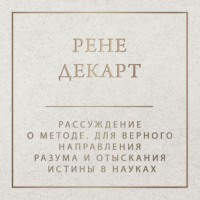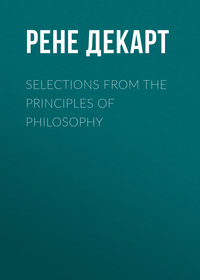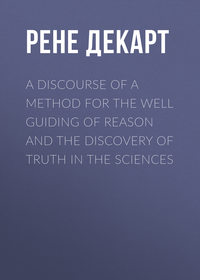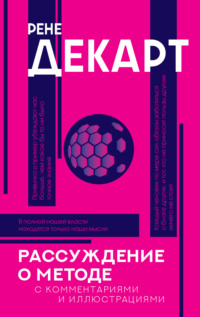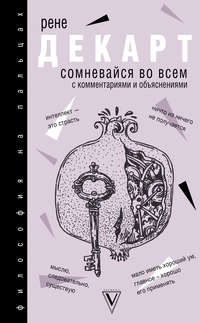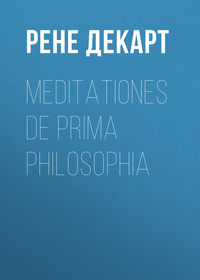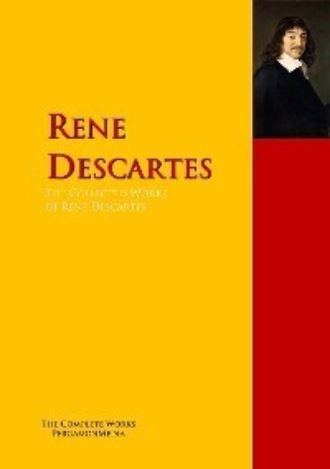
Полная версия
The Collected Works of Rene Descartes
In the next place, I attentively examined what I was and as I observed that I could suppose that I had no body, and that there was no world nor any place in which I might be; but that I could not therefore suppose that I was not; and that, on the contrary, from the very circumstance that I thought to doubt of the truth of other things, it most clearly and certainly followed that I was; while, on the other hand, if I had only ceased to think, although all the other objects which I had ever imagined had been in reality existent, I would have had no reason to believe that I existed; I thence concluded that I was a substance whose whole essence or nature consists only in thinking, and which, that it may exist, has need of no place, nor is dependent on any material thing; so that "I," that is to say, the mind by which I am what I am, is wholly distinct from the body, and is even more easily known than the latter, and is such, that although the latter were not, it would still continue to be all that it is.
After this I inquired in general into what is essential to the truth and certainty of a proposition; for since I had discovered one which I knew to be true, I thought that I must likewise be able to discover the ground of this certitude. And as I observed that in the words I think, therefore I am, there is nothing at all which gives me assurance of their truth beyond this, that I see very clearly that in order to think it is necessary to exist, I concluded that I might take, as a general rule, the principle, that all the things which we very clearly and distinctly conceive are true, only observing, however, that there is some difficulty in rightly determining the objects which we distinctly conceive.
In the next place, from reflecting on the circumstance that I doubted, and that consequently my being was not wholly perfect (for I clearly saw that it was a greater perfection to know than to doubt), I was led to inquire whence I had learned to think of something more perfect than myself; and I clearly recognized that I must hold this notion from some nature which in reality was more perfect. As for the thoughts of many other objects external to me, as of the sky, the earth, light, heat, and a thousand more, I was less at a loss to know whence these came; for since I remarked in them nothing which seemed to render them superior to myself, I could believe that, if these were true, they were dependencies on my own nature, in so far as it possessed a certain perfection, and, if they were false, that I held them from nothing, that is to say, that they were in me because of a certain imperfection of my nature. But this could not be the case with-the idea of a nature more perfect than myself; for to receive it from nothing was a thing manifestly impossible; and, because it is not less repugnant that the more perfect should be an effect of, and dependence on the less perfect, than that something should proceed from nothing, it was equally impossible that I could hold it from myself: accordingly, it but remained that it had been placed in me by a nature which was in reality more perfect than mine, and which even possessed within itself all the perfections of which I could form any idea; that is to say, in a single word, which was God. And to this I added that, since I knew some perfections which I did not possess, I was not the only being in existence (I will here, with your permission, freely use the terms of the schools); but, on the contrary, that there was of necessity some other more perfect Being upon whom I was dependent, and from whom I had received all that I possessed; for if I had existed alone, and independently of every other being, so as to have had from myself all the perfection, however little, which I actually possessed, I should have been able, for the same reason, to have had from myself the whole remainder of perfection, of the want of which I was conscious, and thus could of myself have become infinite, eternal, immutable, omniscient, all-powerful, and, in fine, have possessed all the perfections which I could recognize in God. For in order to know the nature of God (whose existence has been established by the preceding reasonings), as far as my own nature permitted, I had only to consider in reference to all the properties of which I found in my mind some idea, whether their possession was a mark of perfection; and I was assured that no one which indicated any imperfection was in him, and that none of the rest was awanting. Thus I perceived that doubt, inconstancy, sadness, and such like, could not be found in God, since I myself would have been happy to be free from them. Besides, I had ideas of many sensible and corporeal things; for although I might suppose that I was dreaming, and that all which I saw or imagined was false, I could not, nevertheless, deny that the ideas were in reality in my thoughts. But, because I had already very clearly recognized in myself that the intelligent nature is distinct from the corporeal, and as I observed that all composition is an evidence of dependency, and that a state of dependency is manifestly a state of imperfection, I therefore determined that it could not be a perfection in God to be compounded of these two natures and that consequently he was not so compounded; but that if there were any bodies in the world, or even any intelligences, or other natures that were not wholly perfect, their existence depended on his power in such a way that they could not subsist without him for a single moment.
I was disposed straightway to search for other truths and when I had represented to myself the object of the geometers, which I conceived to be a continuous body or a space indefinitely extended in length, breadth, and height or depth, divisible into divers parts which admit of different figures and sizes, and of being moved or transposed in all manner of ways (for all this the geometers suppose to be in the object they contemplate), I went over some of their simplest demonstrations. And, in the first place, I observed, that the great certitude which by common consent is accorded to these demonstrations, is founded solely upon this, that they are clearly conceived in accordance with the rules I have already laid down In the next place, I perceived that there was nothing at all in these demonstrations which could assure me of the existence of their object: thus, for example, supposing a triangle to be given, I distinctly perceived that its three angles were necessarily equal to two right angles, but I did not on that account perceive anything which could assure me that any triangle existed: while, on the contrary, recurring to the examination of the idea of a Perfect Being, I found that the existence of the Being was comprised in the idea in the same way that the equality of its three angles to two right angles is comprised in the idea of a triangle, or as in the idea of a sphere, the equidistance of all points on its surface from the center, or even still more clearly; and that consequently it is at least as certain that God, who is this Perfect Being, is, or exists, as any demonstration of geometry can be.
But the reason which leads many to persuade them selves that there is a difficulty in knowing this truth, and even also in knowing what their mind really is, is that they never raise their thoughts above sensible objects, and are so accustomed to consider nothing except by way of imagination, which is a mode of thinking limited to material objects, that all that is not imaginable seems to them not intelligible. The truth of this is sufficiently manifest from the single circumstance, that the philosophers of the schools accept as a maxim that there is nothing in the understanding which was not previously in the senses, in which however it is certain that the ideas of God and of the soul have never been; and it appears to me that they who make use of their imagination to comprehend these ideas do exactly the some thing as if, in order to hear sounds or smell odors, they strove to avail themselves of their eyes; unless indeed that there is this difference, that the sense of sight does not afford us an inferior assurance to those of smell or hearing; in place of which, neither our imagination nor our senses can give us assurance of anything unless our understanding intervene.
Finally, if there be still persons who are not sufficiently persuaded of the existence of God and of the soul, by the reasons I have adduced, I am desirous that they should know that all the other propositions, of the truth of which they deem themselves perhaps more assured, as that we have a body, and that there exist stars and an earth, and such like, are less certain; for, although we have a moral assurance of these things, which is so strong that there is an appearance of extravagance in doubting of their existence, yet at the same time no one, unless his intellect is impaired, can deny, when the question relates to a metaphysical certitude, that there is sufficient reason to exclude entire assurance, in the observation that when asleep we can in the same way imagine ourselves possessed of another body and that we see other stars and another earth, when there is nothing of the kind. For how do we know that the thoughts which occur in dreaming are false rather than those other which we experience when awake, since the former are often not less vivid and distinct than the latter? And though men of the highest genius study this question as long as they please, I do not believe that they will be able to give any reason which can be sufficient to remove this doubt, unless they presuppose the existence of God. For, in the first place even the principle which I have already taken as a rule, viz., that all the things which we clearly and distinctly conceive are true, is certain only because God is or exists and because he is a Perfect Being, and because all that we possess is derived from him: whence it follows that our ideas or notions, which to the extent of their clearness and distinctness are real, and proceed from God, must to that extent be true. Accordingly, whereas we not infrequently have ideas or notions in which some falsity is contained, this can only be the case with such as are to some extent confused and obscure, and in this proceed from nothing (participate of negation), that is, exist in us thus confused because we are not wholly perfect. And it is evident that it is not less repugnant that falsity or imperfection, in so far as it is imperfection, should proceed from God, than that truth or perfection should proceed from nothing. But if we did not know that all which we possess of real and true proceeds from a Perfect and Infinite Being, however clear and distinct our ideas might be, we should have no ground on that account for the assurance that they possessed the perfection of being true.
But after the knowledge of God and of the soul has rendered us certain of this rule, we can easily understand that the truth of the thoughts we experience when awake, ought not in the slightest degree to be called in question on account of the illusions of our dreams. For if it happened that an individual, even when asleep, had some very distinct idea, as, for example, if a geometer should discover some new demonstration, the circumstance of his being asleep would not militate against its truth; and as for the most ordinary error of our dreams, which consists in their representing to us various objects in the same way as our external senses, this is not prejudicial, since it leads us very properly to suspect the truth of the ideas of sense; for we are not infrequently deceived in the same manner when awake; as when persons in the jaundice see all objects yellow, or when the stars or bodies at a great distance appear to us much smaller than they are. For, in fine, whether awake or asleep, we ought never to allow ourselves to be persuaded of the truth of anything unless on the evidence of our reason. And it must be noted that I say of our reason, and not of our imagination or of our senses: thus, for example, although we very clearly see the sun, we ought not therefore to determine that it is only of the size which our sense of sight presents; and we may very distinctly imagine the head of a lion joined to the body of a goat, without being therefore shut up to the conclusion that a chimaera exists; for it is not a dictate of reason that what we thus see or imagine is in reality existent; but it plainly tells us that all our ideas or notions contain in them some truth; for otherwise it could not be that God, who is wholly perfect and veracious, should have placed them in us. And because our reasonings are never so clear or so complete during sleep as when we are awake, although sometimes the acts of our imagination are then as lively and distinct, if not more so than in our waking moments, reason further dictates that, since all our thoughts cannot be true because of our partial imperfection, those possessing truth must infallibly be found in the experience of our waking moments rather than in that of our dreams.
PART V
I would here willingly have proceeded to exhibit the whole chain of truths which I deduced from these primary but as with a view to this it would have been necessary now to treat of many questions in dispute among the earned, with whom I do not wish to be embroiled, I believe that it will be better for me to refrain from this exposition, and only mention in general what these truths are, that the more judicious may be able to determine whether a more special account of them would conduce to the public advantage. I have ever remained firm in my original resolution to suppose no other principle than that of which I have recently availed myself in demonstrating the existence of God and of the soul, and to accept as true nothing that did not appear to me more clear and certain than the demonstrations of the geometers had formerly appeared; and yet I venture to state that not only have I found means to satisfy myself in a short time on all the principal difficulties which are usually treated of in philosophy, but I have also observed certain laws established in nature by God in such a manner, and of which he has impressed on our minds such notions, that after we have reflected sufficiently upon these, we cannot doubt that they are accurately observed in all that exists or takes place in the world and farther, by considering the concatenation of these laws, it appears to me that I have discovered many truths more useful and more important than all I had before learned, or even had expected to learn.
But because I have essayed to expound the chief of these discoveries in a treatise which certain considerations prevent me from publishing, I cannot make the results known more conveniently than by here giving a summary of the contents of this treatise. It was my design to comprise in it all that, before I set myself to write it, I thought I knew of the nature of material objects. But like the painters who, finding themselves unable to represent equally well on a plain surface all the different faces of a solid body, select one of the chief, on which alone they make the light fall, and throwing the rest into the shade, allow them to appear only in so far as they can be seen while looking at the principal one; so, fearing lest I should not be able to compense in my discourse all that was in my mind, I resolved to expound singly, though at considerable length, my opinions regarding light; then to take the opportunity of adding something on the sun and the fixed stars, since light almost wholly proceeds from them; on the heavens since they transmit it; on the planets, comets, and earth, since they reflect it; and particularly on all the bodies that are upon the earth, since they are either colored, or transparent, or luminous; and finally on man, since he is the spectator of these objects. Further, to enable me to cast this variety of subjects somewhat into the shade, and to express my judgment regarding them with greater freedom, without being necessitated to adopt or refute the opinions of the learned, I resolved to leave all the people here to their disputes, and to speak only of what would happen in a new world, if God were now to create somewhere in the imaginary spaces matter sufficient to compose one, and were to agitate variously and confusedly the different parts of this matter, so that there resulted a chaos as disordered as the poets ever feigned, and after that did nothing more than lend his ordinary concurrence to nature, and allow her to act in accordance with the laws which he had established. On this supposition, I, in the first place, described this matter, and essayed to represent it in such a manner that to my mind there can be nothing clearer and more intelligible, except what has been recently said regarding God and the soul; for I even expressly supposed that it possessed none of those forms or qualities which are so debated in the schools, nor in general anything the knowledge of which is not so natural to our minds that no one can so much as imagine himself ignorant of it. Besides, I have pointed out what are the laws of nature; and, with no other principle upon which to found my reasonings except the infinite perfection of God, I endeavored to demonstrate all those about which there could be any room for doubt, and to prove that they are such, that even if God had created more worlds, there could have been none in which these laws were not observed. Thereafter, I showed how the greatest part of the matter of this chaos must, in accordance with these laws, dispose and arrange itself in such a way as to present the appearance of heavens; how in the meantime some of its parts must compose an earth and some planets and comets, and others a sun and fixed stars. And, making a digression at this stage on the subject of light, I expounded at considerable length what the nature of that light must be which is found in the sun and the stars, and how thence in an instant of time it traverses the immense spaces of the heavens, and how from the planets and comets it is reflected towards the earth. To this I likewise added much respecting the substance, the situation, the motions, and all the different qualities of these heavens and stars; so that I thought I had said enough respecting them to show that there is nothing observable in the heavens or stars of our system that must not, or at least may not appear precisely alike in those of the system which I described. I came next to speak of the earth in particular, and to show how, even though I had expressly supposed that God had given no weight to the matter of which it is composed, this should not prevent all its parts from tending exactly to its center; how with water and air on its surface, the disposition of the heavens and heavenly bodies, more especially of the moon, must cause a flow and ebb, like in all its circumstances to that observed in our seas, as also a certain current both of water and air from east to west, such as is likewise observed between the tropics; how the mountains, seas, fountains, and rivers might naturally be formed in it, and the metals produced in the mines, and the plants grow in the fields and in general, how all the bodies which are commonly denominated mixed or composite might be generated and, among other things in the discoveries alluded to inasmuch as besides the stars, I knew nothing except fire which produces light, I spared no pains to set forth all that pertains to its nature,–the manner of its production and support, and to explain how heat is sometimes found without light, and light without heat; to show how it can induce various colors upon different bodies and other diverse qualities; how it reduces some to a liquid state and hardens others; how it can consume almost all bodies, or convert them into ashes and smoke; and finally, how from these ashes, by the mere intensity of its action, it forms glass: for as this transmutation of ashes into glass appeared to me as wonderful as any other in nature, I took a special pleasure in describing it. I was not, however, disposed, from these circumstances, to conclude that this world had been created in the manner I described; for it is much more likely that God made it at the first such as it was to be. But this is certain, and an opinion commonly received among theologians, that the action by which he now sustains it is the same with that by which he originally created it; so that even although he had from the beginning given it no other form than that of chaos, provided only he had established certain laws of nature, and had lent it his concurrence to enable it to act as it is wont to do, it may be believed, without discredit to the miracle of creation, that, in this way alone, things purely material might, in course of time, have become such as we observe them at present; and their nature is much more easily conceived when they are beheld coming in this manner gradually into existence, than when they are only considered as produced at once in a finished and perfect state.
From the description of inanimate bodies and plants, I passed to animals, and particularly to man. But since I had not as yet sufficient knowledge to enable me to treat of these in the same manner as of the rest, that is to say, by deducing effects from their causes, and by showing from what elements and in what manner nature must produce them, I remained satisfied with the supposition that God formed the body of man wholly like to one of ours, as well in the external shape of the members as in the internal conformation of the organs, of the same matter with that I had described, and at first placed in it no rational soul, nor any other principle, in room of the vegetative or sensitive soul, beyond kindling in the heart one of those fires without light, such as I had already described, and which I thought was not different from the heat in hay that has been heaped together before it is dry, or that which causes fermentation in new wines before they are run clear of the fruit. For, when I examined the kind of functions which might, as consequences of this supposition, exist in this body, I found precisely all those which may exist in us independently of all power of thinking, and consequently without being in any measure owing to the soul; in other words, to that part of us which is distinct from the body, and of which it has been said above that the nature distinctively consists in thinking, functions in which the animals void of reason may be said wholly to resemble us; but among which I could not discover any of those that, as dependent on thought alone, belong to us as men, while, on the other hand, I did afterwards discover these as soon as I supposed God to have created a rational soul, and to have annexed it to this body in a particular manner which I described.
But, in order to show how I there handled this matter, I mean here to give the explication of the motion of the heart and arteries, which, as the first and most general motion observed in animals, will afford the means of readily determining what should be thought of all the rest. And that there may be less difficulty in understanding what I am about to say on this subject, I advise those who are not versed in anatomy, before they commence the perusal of these observations, to take the trouble of getting dissected in their presence the heart of some large animal possessed of lungs (for this is throughout sufficiently like the human), and to have shown to them its two ventricles or cavities: in the first place, that in the right side, with which correspond two very ample tubes, viz., the hollow vein (vena cava), which is the principal receptacle of the blood, and the trunk of the tree, as it were, of which all the other veins in the body are branches; and the arterial vein (vena arteriosa), inappropriately so denominated, since it is in truth only an artery, which, taking its rise in the heart, is divided, after passing out from it, into many branches which presently disperse themselves all over the lungs; in the second place, the cavity in the left side, with which correspond in the same manner two canals in size equal to or larger than the preceding, viz., the venous artery (arteria venosa), likewise inappropriately thus designated, because it is simply a vein which comes from the lungs, where it is divided into many branches, interlaced with those of the arterial vein, and those of the tube called the windpipe, through which the air we breathe enters; and the great artery which, issuing from the heart, sends its branches all over the body. I should wish also that such persons were carefully shown the eleven pellicles which, like so many small valves, open and shut the four orifices that are in these two cavities, viz., three at the entrance of the hollow veins where they are disposed in such a manner as by no means to prevent the blood which it contains from flowing into the right ventricle of the heart, and yet exactly to prevent its flowing out; three at the entrance to the arterial vein, which, arranged in a manner exactly the opposite of the former, readily permit the blood contained in this cavity to pass into the lungs, but hinder that contained in the lungs from returning to this cavity; and, in like manner, two others at the mouth of the venous artery, which allow the blood from the lungs to flow into the left cavity of the heart, but preclude its return; and three at the mouth of the great artery, which suffer the blood to flow from the heart, but prevent its reflux. Nor do we need to seek any other reason for the number of these pellicles beyond this that the orifice of the venous artery being of an oval shape from the nature of its situation, can be adequately closed with two, whereas the others being round are more conveniently closed with three. Besides, I wish such persons to observe that the grand artery and the arterial vein are of much harder and firmer texture than the venous artery and the hollow vein; and that the two last expand before entering the heart, and there form, as it were, two pouches denominated the auricles of the heart, which are composed of a substance similar to that of the heart itself; and that there is always more warmth in the heart than in any other part of the body–and finally, that this heat is capable of causing any drop of blood that passes into the cavities rapidly to expand and dilate, just as all liquors do when allowed to fall drop by drop into a highly heated vessel.


